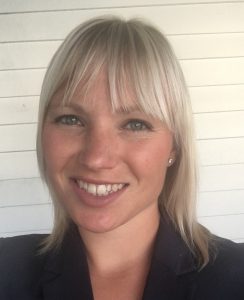
As a market development manager, Jo worked to increase awareness and expand the market opportunity for the use of Medtronic’s cardiovascular devices. Her main project expanded the use of an implantable cardiac monitor (ICM) for patients who had a cryptogenic stroke. A common cause of cryptogenic stroke is atrial fibrillation which originates in the left atrium of the heart. The Medtronic device is 1/3 the size of a AAA battery, and through a minimally invasive technique, sits just under the skin to continuously monitor the heart and detect arrhythmias. Jo’s work focused on helping overcome barriers in ensuring patients had access to these kinds of diagnostic options. This task involved working with both stroke neurologists, who see cryptogenic stroke patients, and with electrophysiologists who implant the devices and track patients once they receive a long-term cardiac monitor. The following are excerpts from the interview with Jo.
What do you find most exciting about the work that you do?
The work I do directly impacts Medtronic patients and customers. Therefore, the most rewarding part of my job is when I get to work with physicians using our devices that improve quality of life for their patients. We are consistently developing new technology which allows us to stay more connected and expands access to more people in need.
What are some activities you were involved with at Hope that helped shape you as a person?
One of my favorite activities was working with Hope’s chapter of Engineers Without Borders. The trip to Cameroon and the work with the local NGO and community members had a lasting impact on me. It helped shape how I view education and sustainability management. In order for work to be sustainable there needs to be a sense of ownership and passion behind the cause. Connecting with people of all different backgrounds helped me value the importance of inclusion, diversity, and teamwork.
What aspect of your engineering education was most helpful?
My time in the Rehabilitation Engineering Lab [performing research with Professor Katie Polasek] was paramount to my engineering education. I utilize the clinical research experience and critical thinking skills every day in my job. My research experience helps set me apart from my peers and allows me to provide a well-rounded perspective for business needs.
Can you comment on the liberal arts aspect of Hope?
I interact with individuals from across many different functional areas and business units regularly. A liberal arts education provided a well-rounded perspective in which I was able to learn and interact with students across other disciplines. As an engineering student, I took advantage of neuroscience courses with other life science students, played a college sport, and performed multidisciplinary research. These experiences, I think, were unique to a liberal arts education.
What advice would you give to current students?
Get involved and take advantage of opportunities to gain project management and leadership skills outside the classroom. These opportunities are plentiful at Hope and will set you apart after graduation.